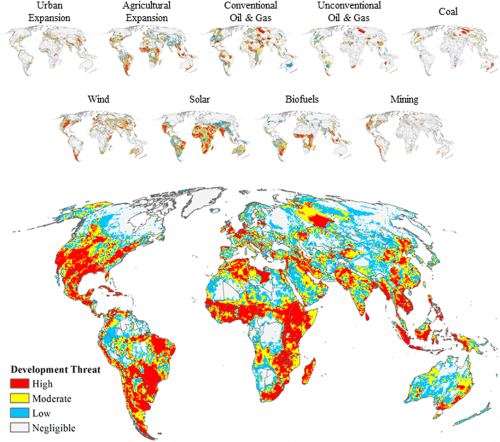According to a study recently published in the journal PLos One, by 2050 the world will lose about a fifth of its natural habitats

According to a study recently published in the journal PLos One under the title "A World at Risk: Aggregating Development Trends to Forecast Global Habitat Conversion, by 2050 the world will lose about a fifth of its natural habitats." The study warns that the loss will increase if the reckless use of resources and especially land, which is mainly due to the increase in the human population, continues.
The results of the population explosion and the use of resources and land will be felt mainly in Africa and South America, i.e. in areas where nature is relatively undamaged. In these areas, the agricultural areas are growing, mines are being opened and the urban areas are growing and spreading into areas that were natural.
The predictions are that by half a century the world's population will increase to more than 9.5 billion people. This growth will cause increasing pressure on the natural environment and an increasing demand for natural resources. According to the researchers "this is an issue that competes with other conservation issues such as climate change".
The researchers identified that 76% of the areas used as natural habitats (excluding Antarctica) and which cover an area of approximately 20 million square kilometers, are home to approximately 20% of the species that will be swallowed up due to population growth and economic development.
The team of researchers identified five factors that push for changes in land use: urbanization, agriculture, mining, fuel production (fossil) and also areas for the production of renewable energy. - Urban areas will double as early as 2030, - Agricultural areas will increase by a third by 2050, - Areas used for mining will increase by 60%.
Africa alone will lose larger natural areas than Australia. The researchers warn that natural areas are at high risk due to "development", this is due to a lack of proper planning and no clear marking of areas for conservation, since only five percent of the areas at risk have legal protection, a number that must increase to reduce the risk to nature.
The researchers emphasize that "the research is not directed against development" since the intention is: "to identify areas where development can be carried out without damage but in "harmony" with the preservation of the natural environment". In order to implement this intention, there is a need for the cooperation of various countries, governments and agencies that will begin to think about how to "divide the landscape"...
Following the study, ecologist Souleymane Konate, from the University of the Ivory Coast, claims that the approach of dealing with the loss of natural habitats "from the top down" is wrong, since environmental conservation must begin at the community level and will only succeed if people understand the importance and value of protecting and preserving natural diversity."
"Hungry people don't care if a certain area is protected, but if they understand that conservation will allow them to profit from environmental jobs, they will be the first to protect the area." Conte concludes.
And yet I maintain that the time has come that instead of controlling the environment for the sake of the human population, there will be control of the human population for the sake of the environment.

3 תגובות
agree. Man causes harm to other animals. This is not his right and he as a race will not survive if he continues this not as a punishment from heaven but because he violates the food/life chain in such a way that the results are disastrous.
I agree with the claim in Sipa of your words. And in particular, it is very important to start educating about birth control in all communities without exception.